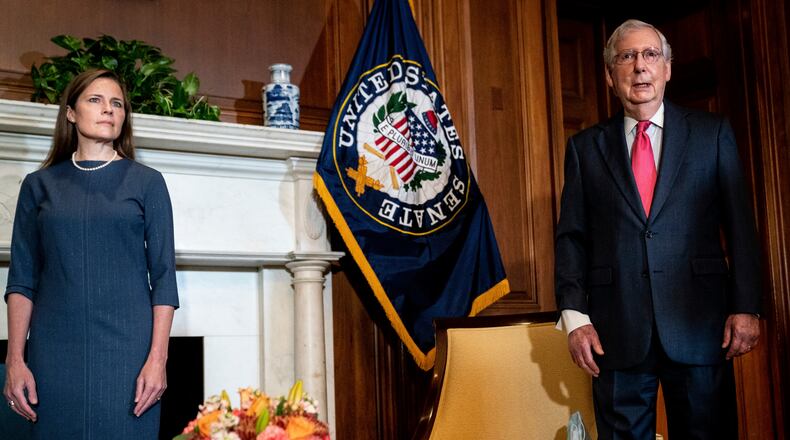During that 2013 interview, O’Conner told a Chicago Tribune reporter she wondered if the court taking the case was a mistake. “(It) stirred up the public,” she said “(and) gave the Court a less-than-perfect reputation.”
With the kangaroo confirmation of Amy Coney Barrett, the Court’s reputation has gone from less-than-perfect to lying in tatters.
The issue with Barrett is not her religion, though personally I believe that religious zealots of all flavors ought to be kept away from the judiciary. Nor is it about her judicial philosophy. What makes her confirmation both a disgrace and a tragedy is that the process by which it happened damages the public standing of the Supreme Court beyond measure.
Every vote Barrett casts, every opinion she authors will be refracted through the shameful way Senate Republicans railroaded her through. Because this was the most nakedly partisan judicial power grab in modern American history, Justice Barrett will never be seen as an independent, impartial jurist.
Since O’Connor’s mea culpa Senate Republicans, in their ruthless efforts to make the Federal bench an adjunct of their party, have only damaged the public perception of the Federal courts even more. Beyond blocking the nomination of Merrick Garland in 2016, Mitch McConnell simply refused to advance the nominations of over 100 federal judges during the Obama administration. He filled them all in the last four years. That’s court packing on an epic scale.
As he did so, Donald Trump smeared and denounced the Federal judiciary like a tin-pot dictator. Every president has disagreed with court decisions during their terms; no president has ever engaged in attacks on the independence of the judiciary itself the way Trump has. In response, Senate Republicans have mostly stared at their shoes.
Trump’s vitriol and the GOP’s capitulation are among the reasons that Chief Justice John Roberts has begun to fret publicly about the reputation of the Federal judiciary, reminding us all that an “independent judiciary is something we should all be thankful for.” The implication here: that independence is under assault.
Republicans may or may not get the rulings they want. Either way, the public’s faith in the integrity of the Court as an independent arbiter has been severely eroded. For that, thank McConnell and his 51 handmaidens.
U.S. Senator Rob Portman, R-Ohio, was among those to vote in favor of Amy Coney Barrett's appointment to the Supreme Court. He explained his reasoning in a recent column. Below are excerpts.
“In the confirmation process, (Judge Amy Coney Barrett) received support across the board. As a law professor at Notre Dame Law School, she won the Distinguished Teaching award three times. Both her fellow professors and her former students spoke highly of her, regardless of their political views or legal philosophies. About three years ago, Judge Barrett was confirmed by a bipartisan vote in the senate for the Circuit Court, one step below the Supreme Court. Her body of work as a 7th Circuit judge puts her, as one opinion piece put it, ‘at the center of the mainstream consensus on the judge's role as an arbiter, not a lawmaker, who abides by the duty to enforce the law as written.'
I was also impressed by her personal story and her commitment to her faith, family, and profession. After earning a full scholarship to Notre Dame Law and graduating first in her class, she earned a prestigious clerkship on the Supreme Court for Justice Antonin Scalia. She then built an exceptional career in the law in private practice, in academia, and on the Seventh Circuit."
Steven Conn, W.E. Smith Professor of History at Miami University, is a community contributor. Community contributors are people who frequently submit fact-based opinion columns.
About the Author

